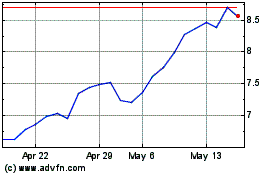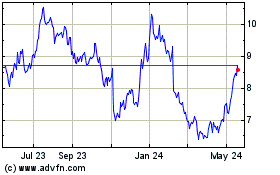Coronavirus Medical-Supply Deliveries Tap Into Growing Relief Logistics Operation
June 26 2020 - 1:47PM
Dow Jones News
By Costas Paris
While the world scrambled for personal protection gear in May to
shield from the coronavirus pandemic, the Canadian government
managed to secure an order for tens of millions of face masks from
Chinese suppliers. But getting the masks to Canada was more
difficult than procuring them.
With no flights coming out of China, Canadian authorities had to
improvise. They turned to Maersk Special Project Logistics, a unit
of Danish shipping and logistics giant A.P. Moller-Maersk A/S that
handles complex supply chain operations, often in hazardous
conditions.
"We leased three Antonov cargo planes and a Boeing 747 and set
up an air bridge from several locations in China to Edmonton in
Alberta," said Robin Townley, the head of Maersk SPL. "Ten days
after we first talked with Canada, we delivered 45 million masks,
more the entire Canadian population."
The flights were part of widespread efforts by relief groups and
logistics providers to bring medicine, protective equipment and
other supplies to countries even as major transportation networks,
including passenger flights that provide critical freight capacity,
were pulled down.
Emergency relief logistics has become a growth industry in
recent years as governments and private groups have raced to
provide food, medical supplies and shelter following natural
disasters and other humanitarian crises that have devastated
communities.
The steps made by private companies, including big cargo
transportation and logistics providers, to organize standards for
relief response accelerated in the aftermath of the Southeast Asia
tsunami in 2004 that killed more than 200,000 and triggered an
enormous, often ad hoc aid effort across a broad geographic
area.
In the U.S., the American Logistics Aid Network was established
in 2005 following what the group called a "logistics nightmare" to
deliver aid following Hurricane Katrina. Supported by donations,
the group connects logistics and transport providers to groups
including the Federal Emergency Management Agency to get supplies
to disaster zones.
ALAN estimates that 80% of all crisis spending by humanitarian
organizations goes to logistics and as much 40% of that may be
wasted as groups often don't have the right freight equipment,
knowledge or connections at their disposal.
Maritime operators have been crucial in rebuilding supply lines
to hard-hit areas. In 2017, Jacksonville, Fla.-based Crowley
Maritime Corp. set up shipping operations to get relief supplies
through to Puerto Rico's damaged main port in San Juan following
Hurricane Maria.
Maersk SPL seeks to embed such dedicated logistics services in
its operations with a permanent staff of around 100, based in the
U.S., Europe, Asia and the Middle East. The unit works mainly with
Maersk clients, but also with bodies such as the World Health
Organization, the U.S. military, large private relief groups and
the United Nations' relief and peacekeeping operations.
"We do high-risk jobs and we are highly profitable, but we also
provide humanitarian services free of charge," Mr. Townley
said.
The unit often uses its parent's assets, as it did in April 2019
in Mozambique, where refrigerated containers were used to
distribute 900,000 vaccines to control a cholera outbreak in the
aftermath of Cyclone Idai.
"There was no electricity in large parts of the country and the
WHO asked us for cold-chain support during the vaccine
distribution. The vaccination campaign was very successful and cut
the outbreak off at the knees," Mr. Townley said.
Mr. Townley, a former U.S. marine involved in intelligence
collection, paramilitary operations and combat search and rescue,
says stepping into crisis situations requires teams with both local
knowledge and global relationships to cut trough red rape and other
obstacles.
His team is made up of workers from 10 nationalities, including
logistics veterans, doctors, former military personnel and an
Egyptian pizza-joint owner who Mr. Townley said was looking for
adventure and is now a senior leader in the operation.
"Our diversity is a big part of what allows us to operate in any
context, on any continent, and expect to succeed," said Mr.
Townley. "We all row together."
Write to Costas Paris at costas.paris@wsj.com
(END) Dow Jones Newswires
June 26, 2020 14:32 ET (18:32 GMT)
Copyright (c) 2020 Dow Jones & Company, Inc.
AP Moller Maersk AS (PK) (USOTC:AMKBY)
Historical Stock Chart
From Dec 2024 to Jan 2025

AP Moller Maersk AS (PK) (USOTC:AMKBY)
Historical Stock Chart
From Jan 2024 to Jan 2025
